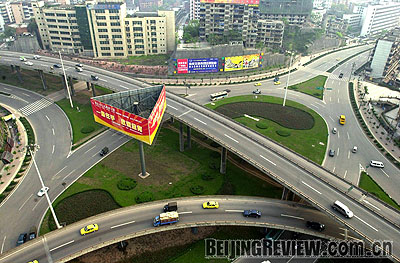 |
| HIGHWAYS AND BYWAYS: Experts believe that the government should adjust the country's fiscal policy, including issuing more bonds to fund infrastructure projects, to boost economic growth |
A global economic recession, ignited by the U.S. subprime mortgage crisis, might be unavoidable in the near future. In the meantime, a significant slowdown in China's economic growth in the third quarter is posing daunting challenges to the government's macro-control policies. Ha Jiming, Chief Economist at China International Capital Corp. (CICC), recently wrote an article in the 21st Century Business Herald about what he believes to be the root cause of China's economic slowdown and how the government can revive the economy. Excerpts follow.
Judging from China's economic cycle during the past three decades, a slowdown in economic growth normally will last for no less than three years. We assume that after reaching a peak in 2007, China's economic growth will hit rock bottom in 2010 at the earliest.
Rebalancing act
The bursting of the U.S. property bubble is the most direct reason for the global economic slowdown. As early as September 2007, we issued a report elaborating upon this conclusion. Property prices in the United States will be going through years of readjustment, reducing American consumption and seriously affecting the profits of export-oriented companies.
The bull-to-bear stock market transformation is an inevitable trend during the rebalancing of the global economy. In recent years, the global economic balance has been worsening as reflected by the ever-increasing U.S. trade deficit and emerging economies' ballooning trade surpluses. During this period of imbalance, global capital markets have enjoyed brisk growth. From 2005 to 2007, the American S&P indexes, the MSCI Emerging Market Index and the Chinese Shanghai Composite Index soared 22 percent, 52 percent and 324 percent, respectively.
Since early this year, the global economy has entered a rebalancing period along with the bursting of the U.S. property bubble, suppressed U.S. consumption and dwindling exports from emerging markets. China's economic slowdown and the decline of company profits are mirrored in the midyear reports of listed companies. Meanwhile, declining exports also have eased the pressure for the appreciation of the Chinese currency.
The rebalancing period will last for at least a year. But when will it end? The U.S. property price readjustment and trade deficit readjustment are two major indicators. Compared with the peak in 2006, home prices in the United States have fallen by 26 percent. We expect them to fall a further 10 percent until next year. The world economy will not be revitalized until the U.S. property market stabilizes.
Dealing with a slowdown
The biggest threats to China's economic growth are inflation and shrinking exports due to weak international demand. In the second half of this year, the inflation rate dropped after reaching a peak, and sinking external demand led to a further decline in exports. In the meantime, real estate investment, another major driver of economic growth, has been falling. Since August, property prices in 70 large and medium-sized cities monitored by the National Development and Reform Commission dropped month on month. The number of cities experiencing falling housing prices increased to 25 in August from five in April.
| 